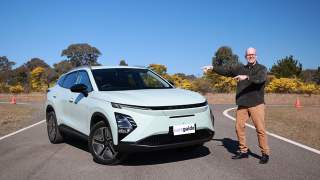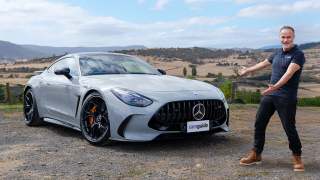
Toyota electric cars: Everything you need to know

It may seem remarkable, as electric vehicles suddenly become a hot political potato, but the fact is that the world's largest car company, and our top-selling brand, Toyota, does not offer a single full EV for sale in this country. Or many anywhere, for that matter.
It seems even more surprising because, perhaps more than any other mainstream car-maker, Toyota is synonymous with pioneering green-friendly environmental technologies, most famously in the slightly ungainly shape of its hybrid sales giant, the Prius, which was first launched here a whopping 18 years ago.
Suddenly, in EV terms, it does look like Toyota is somewhat behind EV innovator Tesla, and the big names that are now getting on board, with Nissan already offering the Leaf in Australia, Jaguar the iPace and Hyundai its new Kona EV and Ioniq (plus Mercedes-Benz, BMW and Audi all entering the market as well).
As you might imagine, Toyota has recently been talking up its EV future, its pledge to create a zero-emissions fleet worldwide by 2050 and its promise that all its models will be "electrified" by 2025. But what does that mean, exactly? Will there be a full electric Toyota for sale in Australia by then? Does "electrified" just mean a hybrid, or a plug-in hybrid electric vehicle (PHEV)?

Let's sort the facts from the speculation and take a closer look at the future of Toyota electric vehicles.
Toyota will make some full EVs... soon
(And it will sell lots of them, in some countries…)
In the far more mature EV market of Europe, Toyota is really talking up its EV future, and sounds quite serious about it.
Toyota Europe says it knows that "petrol-electric hybrids are not the only solution we can use to help deliver better, more energy-efficient transport" and as a result it has been developing battery electric vehicle technology as part of its "future mobility roadmap".
Not only does Toyota Europe believe in EVs, it's going to do its bit to help: "We need to encourage large numbers of people to adopt them, so we will be launching more than 10 battery electric vehicle models by the early 2020s.
"Our battery electric vehicles will help to sell more than 5.5 million electrified vehicles each year by around 2030."
All good news, unless you live in Australia, because "Our first target market will be China, after which we expect to roll them out to customers in Japan, India, the United States and Europe."
Even in the US, however, Toyota seems somewhat hesitant to commit to going fully electric, most likely because it's already doing very well, thanks very much, with its hybrid approach, and plenty more of them planned for the near future. Toyota has also invested heavily in hydrogen fuel cell technology, which is the major alternative to EVs in terms of zero-emission motoring.
Bob Carter, executive vice president of sales for Toyota Motor North America, took offence when asked whether he felt bad getting beaten by Tesla in terms of the EV market.
"I'd argue to the contrary," he said. "When you are looking at full electric, whether it's Tesla or others on the market, they represented last year less than one percent of the industry.
"Our strategy is to keep utilising our hybrids, plug-in hybrids, and eventually bring in battery-electric vehicles as the market grows."

Carter has also predicted that EVs will still only take up between four and six per cent of sales in the US between 2025 and 2030, which is a figure that's lower than most other companies' estimates.
Globally, Toyota has pledged that by 2025, every model in its line-up, and in that of its sister company Lexus, will be "available either as a dedicated electrified model or have an electrified option", which still leaves it plenty of wriggle room to keep selling hybrids.
It has, however, predicted sales of more than 1 million zero-emission vehicles by around 2030.
But what about Toyota EVs in Australia?
The vice-president of sales and marketing for Toyota Australia, Sean Hanley, doesn't sound exactly gung-ho about bringing EVs to our market, perhaps because, like a lot of other industry pundits, he just doesn't think sales are going to explode the way that some politicians predict they will.
"Plug-in electric will be available," he said, but "right now hybrid is leading and in the foreseeable future I think that is what is going to happen," he says.
"Hydrogen fuel-cell [and EV] infrastructure, development and maturity will take some time. In the mean time, Toyota has a credible alternative powertrain called hybrid."
And he also says: "We make no apologies for not having a full EV in the market today."
Which doesn't sound like what you'd say if you were in a hurry to launch a competitor to the Nissan Leaf, or Tesla's Model 3.
As big, powerful and influential as Toyota is, it seems to be banking, for now, on the fact that some people would rather take the Band-Aid solution that is hybrid technology than take the risk on cutting themselves off completely from the safety and security of being able to use petrol stations.
As a Toyota spokesman said recently, the company believes that much more spending on charging infrastructure and solutions to power-supply issues in Australia are needed "before the mass introduction and adoption of electric vehicles in the market can become a reality".

Hanley also points to the obvious continuing success of Toyota's hybrid approach, with the Camry Hybrid now accounting for more than 50 per cent of Camry orders, and the Corolla Hybrid accounting for a third of that badge's sales.
A new RAV4 hybrid is on the way (as is a hybrid HiLux, eventually), and is expected to make up as many as 40 per cent of that car's sales.
As long as Toyota can offer its customers a slightly less scary green option than going fully EV, and make good money doing so, it's not going to be the fastest company to jump on the EV bandwagon, at least in Australia.
If our market starts to move towards EVs quicker than expected, however, the fact that Toyota is already committed to developing them for other markets means it won't take long to react if required.








Comments